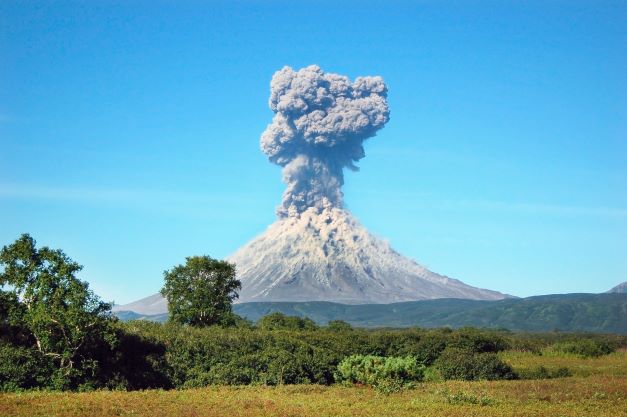
The University of New Mexico has announced a $500,000 grant from the National Science Foundation for a project that will set up the foundation for a national center focused on understanding the fundamental processes that result in hazardous volcanic eruptions.
According to UNM, the National Science Foundation awarded the grant through its Centers for Innovation and Community Engagement in Solid Earth Geohazards Program, which is intended to produce transformative research in the Earth processes that lead to solid Earth geohazards.
The need for a coordinated volcano science community in the U.S. was one of three grand challenges identified by the National Academies ERUPT report.
“The overarching ambition of the center is to optimize the scientific return from responses of the scientific community to volcanic unrest in order to improve the fundamental understanding of volcanoes,” said UNM Professor and lead Principal Investigator Tobias Fischer in the Department of Earth and Planetary Sciences (EPS). “This understanding will aid in producing accurate forecasts of future hazardous volcanic eruptions.”
The CONverging on Volcanic ERuption Science with Equity Center (CONVERSE) Center is one of only four such centers currently supported by this funding program and the only one addressing volcanic hazards. The CONVERSE Center will work in collaboration with scientists and institutions from around the world: Central and South America, Iceland and the Canary Islands, New Zealand, Indonesia, and Singapore.
The Center is co-led by Bruce Houghton from the University of Hawaii, Manoa (co-PI), and volcano and social scientists from UC Davis, UC Berkeley, Columbia, Penn State, and the University of Washington.
At UNM, the CONVERSE Center also involves Yolanda Lin from the UNM Department of Geography and Matthew Fricke from the UNM School of Engineering’s Computer Science department. Other UNM CONVERSE Center collaborators include Cari Hushman from Education and Melanie Moses and Mueen Abdulla, also from Computer Science.
“Many of the world’s most hazardous and active volcanoes that are located near large population centers are located in Central and South America, Europe, and Asia,” said Fischer, an internationally noted volcanologist. “It is these volcanoes that have a high likelihood of erupting and causing lots of damage. If we want to learn about how these types of volcanoes behave during run-up to and during eruptions, we need to be able to make the key measurements at these volcanic sites.
CONVERSE will also try to facilitate the participation of international collaborators in scientific eruption response in the US. UNM is the University of the Americas with very strong ties to Latin America, formally through the Latin American Iberian Institute (LAII) and informally through countless research projects and collaborations.
Likewise, UNM researchers have collaborations with Asia and Europe. The CONVERSE Center could be a formalization of these international collaborations in the realm of geohazards.
Training and education activities are paramount to the Center’s success and will focus on future volcano scientists utilizing the best practices of the entire volcano science workflow and community training and outreach through workshops and eruption scenarios.
A central role of the Center will be as the bridge between the academic community and government agencies responsible for volcano monitoring and eruption response. The center will streamline the partnership with the USGS Volcanic Hazards Program and with observatories and academic partners around the world.
“The center has a significant student training component,” said Fischer. “For example, we are organizing eruption scenario exercises where we simulate the science response to eruptions. We have done this twice so far as part of the RCN. During these exercises, we had strong graduate student participation. We also had a workshop in Albuquerque this summer where graduate students from several universities participated.
“The CONVERSE Center will provide more such training events in the future, and we hope to involve both graduate students and undergraduates. The point is to train and educate students in the general topic of geohazards through the science response to volcanic eruptions.”
The U.S. Army Corps of Engineers has been tasked with…
Brown and Caldwell, a leading environmental engineering and construction firm,…
Humboldt State University, one of four campuses within the California…